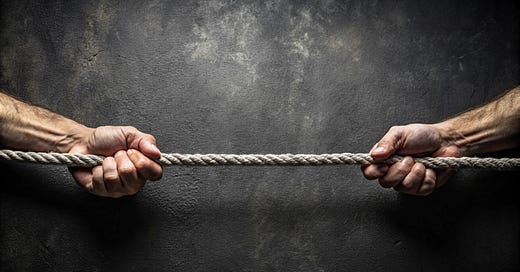As I sit here in the quiet evening, I find my mind drifting, as it often does. But this time, my thoughts are different. Instead of thinking about what I once had, what I could have been, or what was lost, I suddenly find myself stuck in a mental tug-of-war. One that's pulling me in different directions. And one that’s making me question my entire belief system about people.
On one side of the coin, I’ll always have empathy for the mothers, fathers, grandparents, and every other victim of alienation. But most of all, my heart will always hurt for the truest victims of all—the children.
Having been both a left-behind and an alienated parent, I know exactly how those affected feel on a daily basis. I’ve felt the gut-wrenching pain of not having my kids close. I’ve lived with the fear that we’d be lost to each other forever. I also remember the dull ache of wondering how they were doing… if they still loved me… or if they’d been taught to believe I was some kind of monster to be feared.
That’s why, when I speak to other parents going through this mess, I don’t need some fancy degree or a license that says: I understand, because I’ve walked that mile too. I’ve even cried the same tears for my kids, over what they must have suffered and how I was not able to save them. So when I hear about other children who are pulled into this nightmare, I feel it with full intensity. And I hurt for the parent who’s trying to save them too.
But then, we get to the one person who caused all of this pain and emotional torture that each of us is experiencing. The alienator. This is where my empathy comes to a sudden stop.
In some ways, I’m probably different from others, because, for most of my life, I’ve made a real effort not to hate anyone as a person. Instead, I’ve always tried to maintain the belief that you could hate their behavior without actually hating the individual. But when it comes to alienators, that belief falls by the wayside. Because I haven’t just been on the receiving end, I’ve also seen what they do, and just how calculated they really are.
Without a doubt, therapists and researchers will try to explain it away. They'll say alienators are just repeating what was done to them when they were kids. Or that it’s an underlying mental health issue such as Narcissism, or a personality disorder. Some will even chalk it up to them having a sense of self-entitlement. But for me? That doesn’t cut the mustard.
The way I see it, you can slap lipstick or a bowtie on a pig, but at the end of the day, a pig is still a pig. And no matter how you dress it up, abuse is still abuse. Alienation is abuse.
So, unless someone shows me a clear, clinical diagnosis proving that the alienators are incapable of controlling their actions, I’m not handing out free passes or excuses. Not when a child’s life is being torn apart. Not when a loving parent is being erased unjustly. Not when the pain they cause runs this deep.
At the end of the day, I don’t have much love for the alienators who do this, whether it’s out of their need for revenge or it’s rooted in something deeper. Maybe there’s a reason behind it, and maybe there isn’t. But either way, the damage is real. And that kind of pain demands full accountability, not sympathy.
David Shubert




